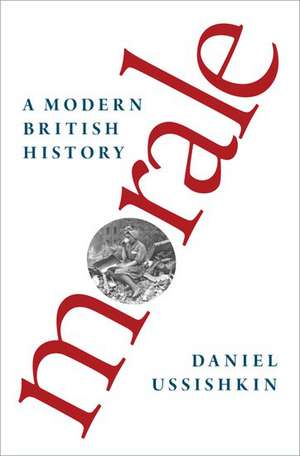Morale: A Modern British History
Autor Daniel Ussishkinen Limba Engleză Hardback – 15 noi 2017
Preț: 268.64 lei
Preț vechi: 332.61 lei
-19% Nou
Puncte Express: 403
Preț estimativ în valută:
51.40€ • 53.81$ • 42.78£
51.40€ • 53.81$ • 42.78£
Carte disponibilă
Livrare economică 27 februarie-05 martie
Preluare comenzi: 021 569.72.76
Specificații
ISBN-13: 9780190469078
ISBN-10: 0190469072
Pagini: 264
Dimensiuni: 239 x 155 x 25 mm
Greutate: 0.5 kg
Editura: Oxford University Press
Colecția OUP USA
Locul publicării:New York, United States
ISBN-10: 0190469072
Pagini: 264
Dimensiuni: 239 x 155 x 25 mm
Greutate: 0.5 kg
Editura: Oxford University Press
Colecția OUP USA
Locul publicării:New York, United States
Recenzii
Morale: A Modern British History skillfully charts the concept's history as both a disciplinary and political issue. It is meticulously researched and lucidly written, and takes a bold approach to its subject. Ussishkin provides a compelling account of morale's historical development from the late nineteenth century to the modern day, and deploys many interesting historical examples to enrich it. ... As the ?rst detailed study of the history of morale in modern Britain, this book is a major addition to intellectual, military, political and socio-cultural history. It deserves to attract a wide readership.
In Morale: A modern British History Daniel Ussishkin narrates, with success and sophistication, this 'history of a concept' in modern Britain, charting its emergence in military theory, followed by its percolation into social theory, its fundamental importance in social sciences and industrial relations, and finally its reinterpretation in the Thatcher years... An accomplished piece of scholarship... it offers many insights that are invaluable not only to historians of morale, the military, or labour. This is at once an intellectual, military, and social history that will provide an important reference point for any scholar of modern Britain and its cultural, economic, military, social, and political patterns. It also shows how the insights offered by focussing on the definition and interpretation of a concept as it ripples through time can offer new insights on the past.
Ussishkin has set himself the ambitious task of historicizing a concept without a clear or stable meaning. Rather than offering a unitary definition himself, he catalogs a variety of definitions in the past... In tracing this genealogy, Ussishkin makes a valuable contribution to a growing body of work on the history of social science and visions of social order more broadly. He also reminds us that even familiar, ubiquitous, and seemingly commonsensical concepts often arrive at that destination by the most circuitous of routes.
In Morale: A Modern British History, Daniel Ussishkin ... masterfully explains the rise and fall of morale in lucid and engaging prose, deftly illuminating the intellectual, cultural, and institutional growth of an idea central to British conceptions of democratic management and to its unraveling. This powerful and engrossing book is of central importance to the intellectual history of British democracy and the modern state.
In Morale: A modern British History Daniel Ussishkin narrates, with success and sophistication, this 'history of a concept' in modern Britain, charting its emergence in military theory, followed by its percolation into social theory, its fundamental importance in social sciences and industrial relations, and finally its reinterpretation in the Thatcher years... An accomplished piece of scholarship... it offers many insights that are invaluable not only to historians of morale, the military, or labour. This is at once an intellectual, military, and social history that will provide an important reference point for any scholar of modern Britain and its cultural, economic, military, social, and political patterns. It also shows how the insights offered by focussing on the definition and interpretation of a concept as it ripples through time can offer new insights on the past.
Ussishkin has set himself the ambitious task of historicizing a concept without a clear or stable meaning. Rather than offering a unitary definition himself, he catalogs a variety of definitions in the past... In tracing this genealogy, Ussishkin makes a valuable contribution to a growing body of work on the history of social science and visions of social order more broadly. He also reminds us that even familiar, ubiquitous, and seemingly commonsensical concepts often arrive at that destination by the most circuitous of routes.
In Morale: A Modern British History, Daniel Ussishkin ... masterfully explains the rise and fall of morale in lucid and engaging prose, deftly illuminating the intellectual, cultural, and institutional growth of an idea central to British conceptions of democratic management and to its unraveling. This powerful and engrossing book is of central importance to the intellectual history of British democracy and the modern state.
Notă biografică
Daniel Ussishkin is Associate Professor of History at the University of Wisconsin-Madison.
